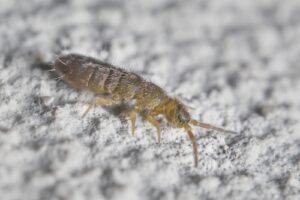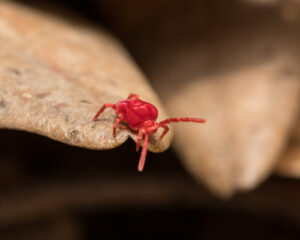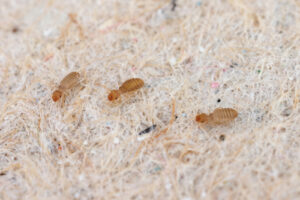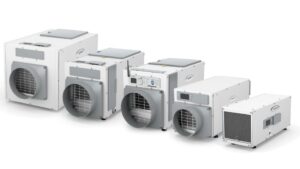Springtails, Clover Mites, and Psocids: Tiny Intruders in Your Home
By Zachary Ciras on July 14, 2025.
As warmer weather arrives in New England, tiny arthropods like springtails, clover mites, and psocids often make their way indoors, sparking concern among homeowners. These pests can appear in large numbers but are generally harmless nuisances rather than threats. In this post, we’ll break down their biology, behaviors, optimal conditions, risks (or lack thereof), and why cultural changes—not structural pesticides—are the best management strategy. At Colonial Pest Control, we prioritize sustainable solutions to keep your home pest-free, including our enhanced Gold Preventative Maintenance Program with new dehumidifier offerings.
Springtails: Biology and Behavior
Springtails (order Collembola) are tiny, wingless hexapods (not true insects), measuring 1-2 mm, often white, gray, or black. Named for their furcula—a tail-like appendage that lets them jump when disturbed—they thrive in moist, organic-rich environments like soil, leaf litter, basements, bathrooms, or kitchens.
 They feed on decaying matter, fungi, and algae, playing a beneficial role in ecosystems. Optimal conditions include high humidity (>70%) and damp areas from overwatering, leaks, or poor drainage. They don’t bite, sting, or damage property but signal moisture problems.
They feed on decaying matter, fungi, and algae, playing a beneficial role in ecosystems. Optimal conditions include high humidity (>70%) and damp areas from overwatering, leaks, or poor drainage. They don’t bite, sting, or damage property but signal moisture problems.
Clover Mites: Biology and Behavior
Clover mites (Bryobia praetiosa) are reddish-brown arachnids (related to spiders), about 0.75 mm long, with elongated front legs. They feed on plant sap from clover, grasses, and vegetation, becoming active in spring and fall.
 They invade homes during dry or cold spells, clustering on windowsills, walls, or furniture, and leave red stains if crushed. Ideal conditions: warm, sunny spots with lush plants near buildings. They pose no health risks but can be a cosmetic issue.
They invade homes during dry or cold spells, clustering on windowsills, walls, or furniture, and leave red stains if crushed. Ideal conditions: warm, sunny spots with lush plants near buildings. They pose no health risks but can be a cosmetic issue.
Psocids: Biology and Behavior
Psocids, or booklice (order Psocoptera), are soft-bodied insects, 1-2 mm long, pale gray or brown. Not true lice, they feed on mold, fungi, starches, and debris in damp, warm spots like kitchens, bathrooms, basements, books, or stored food.
 They flourish in humidity above 60% and poor ventilation, indicating mold or moisture issues. They don’t bite, spread disease, or cause damage but can contaminate food or papers in high numbers.
They flourish in humidity above 60% and poor ventilation, indicating mold or moisture issues. They don’t bite, spread disease, or cause damage but can contaminate food or papers in high numbers.
Risks and Why They’re Harmless
– Springtails: No bites, diseases, or structural harm; just a nuisance highlighting dampness.
– Clover Mites: Harmless to humans/pets; may stain surfaces or mildly affect plants.
– Psocids: Non-destructive; no health threats, but signal humidity problems.
These pests are indicators of environmental issues, not invaders requiring aggressive control.
Why Structural Pest Control Is Limited
Pesticides offer short-term relief but fail long-term:
– They don’t address root causes like moisture or vegetation.
– Modern formulations of pesticides are not readily available to these tiny pests after they dry.
– Physical exclusion, removal of algae and fungal growth, and humidity control are required.
– Ineffective indoors where pests hide or rebound quickly, especially after the material initially dries.
Focus on prevention for eco-friendly results, enhanced by integrated solutions like our Gold Program.
Enhancing Prevention with the Gold Preventative Maintenance Program
Our Gold Semi-Annual Preventative Maintenance Program delivers two targeted treatments during peak pest seasons, creating a protective barrier around your home’s exterior. This program includes complimentary services for ongoing support, ensuring year-round protection without constant interventions.
Now, we’re excited to introduce a new offering: installation and maintenance of AprilAire dehumidifiers. These whole-home systems work in symbiosis with our treatments, reducing indoor humidity to levels pests can’t tolerate—helping in ways chemicals alone won’t, such as preventing mold growth and structural damage. Dehumidifying not only deters springtails, psocids, and similar moisture-loving pests but also helps prevent more destructive invaders like carpenter ants, termites, and wood-boring beetles by keeping wood dry and unappealing.

As an extension of the Gold Program, we offer expert installation in basements, crawl spaces, or other problem areas, with regular maintenance to keep your system running efficiently. This integrated approach combines cultural changes with professional support for superior, sustainable results.
Cultural Changes for Effective Management
For Springtails:
– Reduce Moisture: Fix leaks, use dehumidifiers (<60% humidity), improve ventilation. Consider our AprilAire installation for optimal control.
– Manage Debris: Clear mulch/leaf litter from foundations; avoid overwatering.
– Seal Entries: Caulk cracks, add door sweeps.
For Clover Mites:
– Landscaping: Create 1-3 ft gravel barriers; trim vegetation away from walls; limit fertilizers.
– Seal Home: Weatherstrip gaps; screen vents.
– Clean Up: Vacuum (don’t crush); dispose of bags.
For Psocids:
– Control Humidity: Dehumidify and ventilate storage areas with AprilAire systems for lasting results.
– Store Properly: Use airtight containers for food/papers; check for mold.
– Maintain Cleanliness: Vacuum regularly; remove debris.
General Tips:
– Inspect damp/vegetated areas routinely.
– Vacuum visible pests.
– Increase the distance between vegetation, ground cover, and organic debris and your structure.
See also: Ants, Moisture, and Pest Control
When to Call Colonial Pest Control
If infestations persist, our team offers inspections, exclusion, and tailored habitat modifications with minimal chemicals. Upgrade to the Gold Program today for comprehensive protection, including enhancing to dehumidifier services.
Conclusion
Springtails, clover mites, and psocids are manageable with simple tweaks to moisture, landscaping, and storage—now supercharged by our Gold Preventative Maintenance Program and AprilAire dehumidifiers. By addressing these, you’ll prevent issues naturally while safeguarding against tougher pests. Contact Colonial Pest Control today for personalized advice—protecting your home and the environment is our priority!